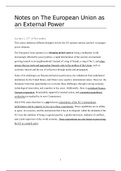Notes on The European Union as
an External Power
Lecture I, 27 th of November:
This course addresses different thoughts on how the EU operates abroad, and how it manages
power relations.
The European Union operates in a changing global context, being a multipolar world
increasingly affected by power politics, a rapid deterioration of the security environment,
growing turmoil in its neighbourhood (‘instead of a ring of friends, a ring of fire’), and other
powers that use tools and approaches formerly only in the toolbox of the Union, such as
economic interest and the use of soft power through media and propaganda.
Some of its challenges are Russian territorial assertiveness, the withdrawal from multilateral
institutions by the United States, and China’s new assertive international stance. However, the
European Union has opportunities to overcome these challenges, through a strong economy,
technological innovation, and expertise in key areas. Additionally, there is revitalised Franco-
German cooperation, broad public support for external action, and a potential geopolitical
awakening (as marked by its new Commission).
Hill (1992) states that there is a gap between expectations of the EU’s international
performance and its capacity to live up to these expectations. These capabilities are its ability
to agree, its resources, and the instruments that it has at its disposal, whilst the demands of the
EU were the ambition of being a regional pacifier, a global intervenor, mediator of conflicts,
and a joint supervisor of the world economy. These expectations are also based on perceiving
the EU as a stately actor.
1
,There are different kinds of power:
o Soft power: ‘making others want what you want’ through economics, ideas, and
attractiveness of one’s culture (Nye, 1992). It purports co-optive power to attract states
in one’s orbit, making use of economic interdependence, possessing capacity for
effective communication, developing and using multilateral institutions to shape
international norms, and to mobilise intangible factors such as ideology, culture, and
institutions.
o Normative power: projecting norms and constructing them in the international arena
(Manners, 2002, 2006). The concept is explicitly aimed at capturing the EU moving
away from Cold War approaches. It stresses the absence of physical force, and the
ability to define the ‘normal’ in the international arena, leading with values and norms.
Ex.: art. 21 TEU: foreign policy of the EU should be based on the same values that
brought the member states together.
o Transformative power: EU transfers rules, norms, and regulations via enlargement.
Hence, enlargement is the EU’s most important soft power tool (Rehn, 2008).
Transformative power purports the power to export EU rules, regulations, and
principles to candidate states, which amounted to broad reforms that appeared to
change every aspect of politics and policy. Power depends on the perspective on
membership, and is exercised through conditionality, capacity building, and
socialisation.
Development: a ‘geopolitical awakening’, as seen in the call to combine hard and soft power
in the EU’s Global Strategy of 2016.
Differing concepts of power are linked to time, the power of the European Union is evolving.
Pre-1990’s, it was mainly a normative power, followed in the 1990s by the utilisation of soft
power after the Cold War. In the 2000s, the EU used transformative power, and after the
geopolitical awakening in the last decennium, the power of the EU revolves around
geopolitical power and strategic autonomy.
2
, The European Union’s influence in the world consists of its economic power, the CFSP and
its decision-making and outcomes, a slowly evolving common defense policy, regulations
(‘the Brussels effect’), association agreements as a form of external governance, ‘the pull of
Europe’: enlargement and enlargement governance and management, and lastly development
assistance and trade agreements.
‘Sui generis foreign policy’: a less centralised, unitary foreign policy that is being conducted
now by the EU as opposed to other states. However, it has brought together various
competencies, instruments, and resources to a goal of a common foreign policy. The
assembling hereof is positive for its geopolitical awakening, although difficult to realise.
External governance: jointly governing domains with third countries, hierarchical or
network based. It involves a set of tools and regulations engaging with governmental and non-
state actors. It is enshrined in treaties, partnerships or trade agreements. It purports joint
responses to market challenges, or other externalities.
A new unified approach of the European Union is focused on seeking strategic autonomy with
three objectives, namely to achieve stability, disseminating EU standards, and promoting EU
values.
3





